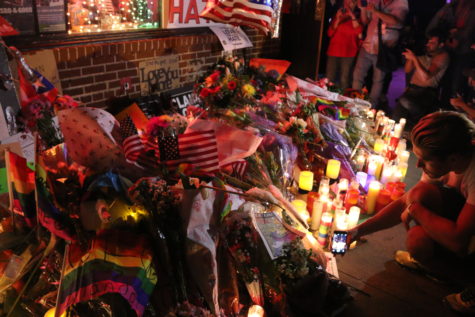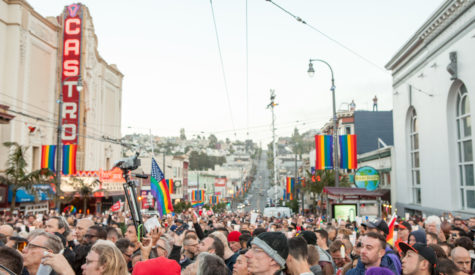
Let me tell you a story.
In the summer of 1991, when I was 21 years old, I worked in a genetics lab at Baylor College of Medicine in Houston. I wasn’t yet out, but had heard about a popular gay bar called Heaven in the city’s Montrose neighborhood. When a new friend asked me to go to Heaven with her for a night of dancing over the July 4th weekend, I felt a shiver of excitement and fear. My fear won out, and I declined.
On July 5th, at two o’clock in the morning, a 26-year-old gay man named Paul Broussard was walking home from Heaven with two friends when they were confronted by a group of 10 intoxicated young men, some of whom had also taken marijuana and LSD. As several members of the group later admitted, they were specifically targeting gay men that night. Broussard’s friends escaped by running down a busy street. Broussard wasn’t as lucky, and ran into a dead end. Outnumbered and surrounded, he was stabbed and pummeled to death with steel-toed boots, a Buck knife and a 2-by-4 spiked with nails at one end.
I remember gasping in horror at the story in the Houston Chronicle. I couldn’t tell anyone else about my terror, but I avoided the entire Montrose neighborhood for the rest of the summer. Four months later, I was back in Moorhead, Minn., for my senior year in college when a 24-year-old gay man named Phillip Smith was gunned down after leaving the same Houston gay bar. He reportedly enraged his attacker, who had planned to rob him, by smiling at him. During an ensuing protest by the group Queer Nation, one man held a placard that read: “Hate Kills.”
Facts matter. Words matter. History matters. As a science writer, I deal in facts all the time, and live in fear of making a big mistake. In the aftermath of the horrific attack on Orlando’s Pulse bar, I’ve been dealing with intense emotions and have seen many of my friends living in fear. I’ve seen easily debunked statements about the gunman and guns and gay bars and the history of violence aimed at LGBT establishments go uncorrected, and it makes my heart hurt.
The Associated Press recently corrected itself and other media outlets in clarifying that the attack on Pulse was the deadliest shooting in modern U.S. history. It’s important to understand that other atrocities have been committed in the nation’s past, like the targeted killing of emigrants, Native Americans and African Americans in places like Mountain Meadows and Wounded Knee and Tulsa.
Several media accounts have mentioned a “handful” of other gay bars that have been targeted across the U.S. That isn’t accurate either. It’s important to understand that dozens of gay and lesbian bars have been singled out over the past half-century, in places like Atlanta and New Orleans and New York and Minneapolis and Seattle. Assailants have used guns and fists and a nail-studded bomb and chunks of concrete and a hatchet and fire.
On the Towleroad blog, a recent post and several commenters compiled a partial list of more than 20 attacks committed at gay bars in the U.S. since 1973. Four years earlier, the riots that erupted after a police raid on a New York bar called the Stonewall Inn helped to spark the nation’s gay rights movement. Amid preparations for Gay Pride events this month, yet another candlelit memorial has sprung up in front of Stonewall.
Gay bars have doubled as community centers and gathering spaces in towns and cities that have lacked any other places where people can safely hold hands or kiss without being shamed or insulted or physically attacked. It’s why the question, “Where was your first gay bar?” has prompted a viral burst of nostalgia on Facebook this week, prompting thousands of men and women to recall the places where they encountered other people like them, where they found a refuge or sanctuary or just a place to dance and drink. It was OK. It was safe.
Let me tell you another story.
When I finally mustered up enough courage to go to a gay bar during the second half of my senior year in college, it was to a monthly party put on by a local businessman who hired a DJ and rented a ballroom attached to a dingy motel in Moorhead. There were no other options within 3½ hours in any direction, so people drove hundreds of miles for the word-of-mouth events. The first time I went, I ran into a half-dozen people I knew from school. After the initial jolt of panic, I realized we were all there because it was OK. It was safe.
I met my husband while watching football at a gay bar called The Hangar on Christopher Street in Manhattan in 2002. When I came out to my sister in the summer of 1992, her roommate took me to the Saloon, a popular gay bar in Minneapolis. Later that year, I made three lasting friendships at a gay bar called R Place within a month of moving to Seattle. The name wasn’t a random designation. It was OK. It was safe.
In 2010, a man shouting racist and homophobic slurs was arrested for attacking patrons and a bartender at two bars on Christopher Street, including one directly across the street from The Hangar. In June 2014, two gay men were shot in the head and killed by a man they had met minutes earlier outside R Place. Police later said they believed the murders were premeditated and that the killer had lured his victims through a gay dating app. Four months later, another man was arrested for hurling anti-lesbian slurs and threatening to kill a woman security guard and her co-worker at the front door of the same bar.
The same month, a man passing by the Saloon in Minneapolis saw two men kissing in the bar’s patio. According to a security guard, the attacker shouted an anti-gay epithet and shot one of the men in the leg with a BB gun (fortunately not seriously) before being tackled by the guard. While on the ground, the man recited a passage from the Bible and told the guard he was going to hell.
In the ‘90s, I went dancing regularly with a close friend and fellow graduate student at a big gay nightclub in Seattle called Neighbours. Amid the stress of lab work and oral exams and dissertations, it was a place to be goofy and laugh with friends and dance all night—white, black, Latino, Asian, all of us. Just like Pulse, it was OK. It was safe. Moments after midnight on New Year’s Day, 2014, an arsonist tried to burn Neighbours down with 750 people inside the club. After he poured gasoline on a stairwell and lit it on fire, employees quickly doused the flames with an extinguisher, narrowly averting disaster.
The 32 men who burned to death or died of smoke inhalation in 1973 at the UpStairs Lounge in New Orleans weren’t as lucky. Before Orlando, it was the deadliest attack on LGBT people in U.S. history. A 2013 story in the Advocate tells the story of two victims, boyfriends George Mitchell and Horace Broussard. Mitchell initially escaped but went back into the inferno to save Broussard. They died in each other’s arms.

Facts matter. Words matter. History matters. Context matters. When a presidential candidate blames the terrorism at Pulse on lax immigration policies, it’s important to point out that the 29-year-old shooter was a U.S. citizen—just like most of the other assailants who have targeted gay bars. Some have been motivated by religious or political extremism; some may have been wrestling with their own personal demons and internalized homophobia. Like their victims, however, they included men of varied ethnic and racial backgrounds.
When the same political candidate says that there’s been “no real assimilation” of American Muslims into our culture and suggests that mosques be closed to prevent radicalization, it’s important to point out the centuries of Muslim integration and civic engagement that predate even the Revolutionary War and the research that suggests, “Muslims who regularly attend mosques are more likely to work with their neighbors to solve community problems, be registered to vote, and are more likely to plan to vote.”
When commentators suggest that tighter gun control laws wouldn’t have prevented the attack, it’s important to point out that since 1996, the Dickey Amendment has banned the Centers for Disease Control and Prevention from using federal funds to even study gun violence – something the American Medical Association has labeled a “public health crisis.”
When the backers of bills that prevent transgender individuals from using the bathroom that matches their identity cite their fear of a predator stalking women and children to justify the legislation, it’s important to point out the absence of sexual violence or public safety issues in bathrooms within the hundreds of municipalities with existing nondiscrimination laws.
It’s also important to recall what happened when a true predator stalked the bathrooms at Pulse in Orlando with a Sig Sauer MCX .223-caliber rifle. He didn’t discriminate between the men and women who had sought safety there when he opened fire.
Boyfriends Juan Ramon Guerrero and Christopher “Drew” Leinonen hoped to get married. They both died in the attack and will instead be buried in a joint funeral.
It’s not OK. It’s not safe. And if we as a country want to ever begin considering how to put the pieces back together and keep it from happening again and again and again, whether in a gay bar or an African-American church or a Jewish community center or a Sikh temple or a movie theater or a high school or a college campus, it’s important to remember that facts matter. That words matter. That history matters. And that the message on a placard waved 25 years ago is just as true today: Hate kills.
Top image: Candlelight vigil at the Stonewall Inn for victims of the Pulse nightclub massacre,courtesy of Elisa G Schneider, via Flickr.
Bottom image: Vigil on Castro Street in San Francisco, courtesy of Pax Ahimsa Gethen, via Flickr.
Thank you for so passionately communicating what has been trapped in a jumble of emotions in my heart.
Thank you for this, Bryn. I feel simultaneously saddened and elevated by your words.
This was an excellent blog straight from your heart. How proud I am of you for having the courage to write it.
Thank you for writing this important, moving piece, Bryn. It’s a powerful reminder of our responsibility as reporters, and people, to challenge the lies that allow intolerance to persist.
Beautifully written, my heart aches for you and all the LGBT folks who cannot feel safe to be who they are. We MUST do more to confront hatred and bigotry, and to change the insane laws regarding guns, especially assault riffles, in our country. Thank you for writing…..
Thank you for writing this touching and profound piece!
My heart smiled and cried while reading this. Often, people are only presented with a narrow field of vision into incidents such as these and allows us to trivialize the causes and effects. Thank you so much for broadening the scope and making us acknowledge that these events are not as isolated and simply explained as some would lead us to believe.
Great piece and right on. Rosalie shared this with our Priest tonight who has spoken so in sympathy with those who have been attacked. He likely will read at Mass tomorrow. So sad that this has to happen in the land of the free.
thank you,Bryn
Thanks Bryn, I love you guys.
Thanks for this Bryn. Thanks especially for the reminder that what we do matters in the face of these tragedies–facts, words, history–and to strive to continue to get them all right.